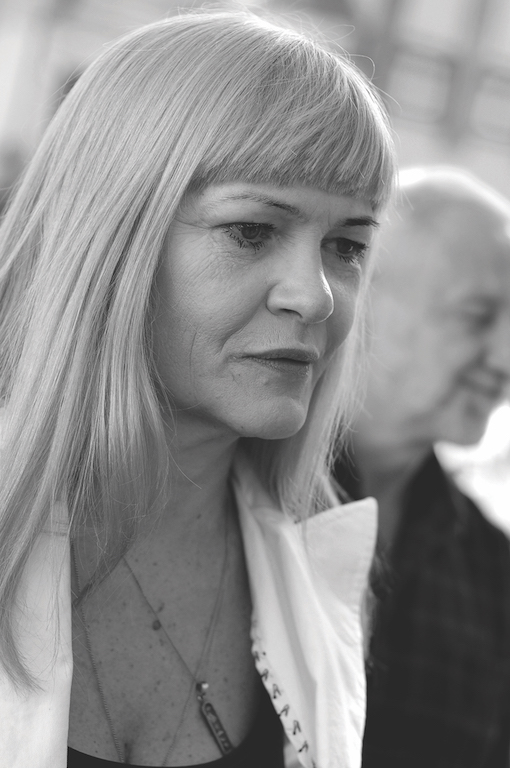Dear Sylvia,I write you in as harsh a winter as when in an ambulanceThanatos leaned over you, and I didn’t knowwhat Eros looked like, since I was only eight.But I am eight years older now than you were then,and in order to understand your departurefrom this crazy Casino, on whose roulette wheeldepends not only money and glory, but evencompletely unsuspecting in the next roomsleeping infants, hugging their stuffed predators,I translated your poems: I understood that you were ableto exist, already looking at yourself from a distance,—as if this everyday world were a bee box,from which burning unintelligible Latin syllables would draw you like its owner—Caesar.Maybe you can tell me alsowhy the sound of the door to the next room opening at half past seven, at dawn,returns to the bee box, to the swarm itself,and I can’t understand this international conversation through a blacktelephone coffin—between you and me. Laiškas Sylvia Plath 1995 gruodžio 1 d. Mieloji Silvija, rašau Tau tokia pat atšiauria źiema kaip tada, kai greitosios pagalbos automobilyjevirš Tavęs pasilenkė Thanatos ir aš nežinojau,kaip atrodo Eros, būdama tik aštuoneriu.Užtat dabar esu aštuoneriais metais vyresnė už Taveir tam, kad suprasčiau Tavo pasitraukimaiš šio beprotiško Casino, ant kurio ruletėsužstatomi ne tik pinigai ir šlovė, bet ir niekoneįtariantys gretimame kambaryjemiegantys kūdikiai, apsikabinę pliušinius plėšrūnus,išverčiau Tavo eilėraščius: supratau, jog Tu sugebėdavaiegzistuoti, jau iš toli žvelgdama į save,—lyg šis kasdienis pasaulis tebūtu avilys,iš kurio sklindantys nesuvokiami lotyniški skiemenys trauktu Tave lyg jo savininka—Cesarį.Gal gali atsakyti, kodėl ir maneduru girgžtelėjimas gretimame kambaryje pusę aštuoniu ryto, brėkštant,sugražina į avilį, į patį bičiu spiečiu,ir aš nebesuprantu šio tarptuatinio pokalbio su juodutelefono karstu—tarp Tavęs ir manęs.
Letter to Sylvia Plath
1 December 1995
Feature Date
- September 4, 2019
Series
- Editor's Choice, Translation
Selected By
- Jennifer Atkinson
Share This Poem
Print This Poem
Copyright © 2019 by H.L. Hix
All rights reserved.
Reproduced by Poetry Daily with permission.

Tautvyda Marcinkevičiūtė has published more than a dozen collections of poetry at home in Lithuania. The most recent of these are Mano Poe(ma)ma (“My Poe(ma)ma”), 2017, and Veiksma-žodinė (Action Verb Acts), 2018. Authorized by the Plath estate, she is the official Lithuanian translator of Sylvia Plath’s Collected Poems (2017). Her many writing awards include the Poezijos Pavasaris (“Poetry Spring”) national poet laureateship.

Sandpoint, Idaho
Tautvyda Marcinkevičiūtė claims among her literary exemplars Marina Tsvetaeva, and one evidence of the force of Terribly in Love is its resonance with Tsvetaeva’s claim that “The only salvation for me and my works is that, in my case, the demand of the time has turned out to be the command of conscience, a thing of eternity.”
So it has proven for Marcinkevičiūtė. She is a female poet in a patriarchal society, and a Lithuanian poet active through her nation’s transition from Soviet satellite to EU member. The times have placed on her demands that have proven commands of conscience: to live as a woman and speak as a woman in a society that privileges male action, male vision, male voice; to live and speak as a citizen of a small nation under the rule of a large nation; to live and speak as a citizen of a small nation now being ruled (as are all nations) by the global market economy.
The poetry of Tautvyda Marcinkevičiūtė addresses with courage and clarity the question of how not only to survive, but also to maintain dignity and pursue integrity, in such conditions, how to fight back against the monsters of diminishment.
This bilingual edition is the first English-language collection by the most celebrated woman poet in Lithuania today. Tautvyda Marcinkevičiūtė’s voice is both cool and ferocious, as one might expect from the official translator of Sylvia Plath into Lithuanian. Six Lithuanian and American translators including poets H.L. Hix, Julie Kane, and Jonas Zdanys have collaborated to bring this important poet—writing in a language with only three million speakers—to a world audience.
Poetry Daily Depends on You
With your support, we make reading the best contemporary poetry a treasured daily experience. Consider a contribution today.




